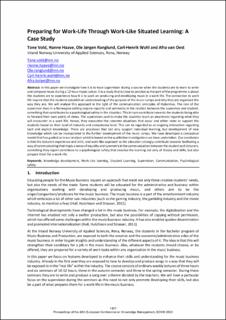Preparing for Work-life Through Work-like Situated Learning: a Case Study
Peer reviewed, Journal article
Published version
Permanent lenke
https://hdl.handle.net/11250/3122891Utgivelsesdato
2023Metadata
Vis full innførselSamlinger
Originalversjon
Proceedings of the European Conference on Knowledge Management. 2023, 24 (2), 1421-1428.Sammendrag
In this paper we investigate how it is to have supervision during a course when the students are to learn to write and compose music during a 12-hour music camps. It is a study that is close to practice as the part of the programme is about the students are to experience how it is to work on producing and developing music in a work life. The connection to work life require that the students establish an understanding of the purpose of the music camps and why they are organized the way they are. We will analyse this approach in the light of the communication principles of Habermas. The role of the supervisor does in a Norwegian setting require equality and symmetry in the relation between the supervisor and student, something that contributes to a psychological safety in the situation. This in turn contribute towards the students being able to forward their own points of views. The supervisors seek to make the students reach an awareness regarding what they will encounter in a work life. Hence, they encounter the concrete situations that occur and either steer or support the students based on their level of maturity and competency level. This can be regarded as an ongoing interaction regarding tacit and explicit knowledge. These are processes that not only support individual learning, but development of new knowledge which can be incorporated in the further development of the music camps. We have developed a conceptual model that has guided us in our analysis which is based on the qualitative investigations we have undertaken. Our conclusion
is that the lecturers experience and skills, and work-like approach to the education strongly contribute towards facilitating a way of communicating that imply a sense of equality and symmetry in the communication between the student and lecturers, something they report contribute to a psychological safety that enables the learning not only of theory and skills, but also prepare them for a work-life.
